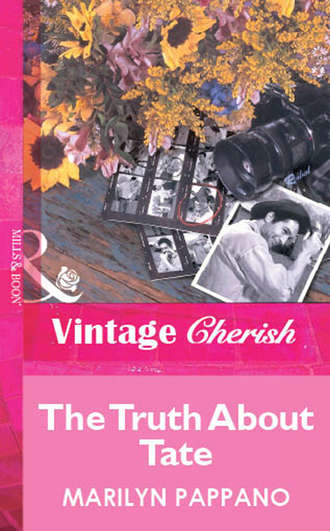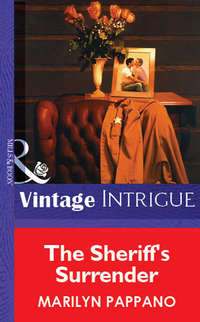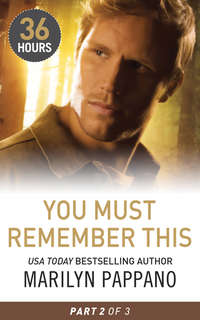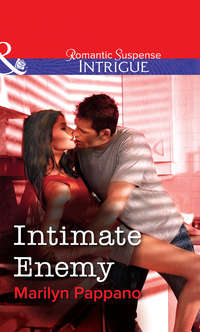
Полная версия
The Truth About Tate
She turned right onto the street the clerk had pointed out, drove past a few businesses, an elementary school, two mobile home parks and a now-defunct plant that, according to the faded, peeling sign on one building, had once manufactured bricks. Now it was secured by a tall chain-link fence that trapped windblown leaves and trash inside, and looked empty and forlorn.
The odometer slowly rolled over—one mile, two, three. She was beginning to wonder if she’d been sent on a wild-goose chase, when a barn came into sight ahead on the left. It was octagonal in shape, painted bright red, and in huge block letters around the sides was painted The Old Mayfield Barn. Directing muttered curses toward the postal clerk, she slowed to turn right onto a dirt road.
About four or five miles, he’d said. She’d gone exactly four and a half miles when she turned into a driveway and stopped. A pipe gate formed an arch over the cattle guard that stretched across the drive, and a sign dangling from the arch announced that this was, indeed, the Rawlins Ranch. For a moment she simply sat there, engine idling. Since she’d come up with this less-than-brilliant plan to visit J. T. Rawlins on his own turf, she’d convinced herself that he would be so impressed by her professionalism, won over by her sincerity or maybe simply worn-out by her determination, and would agree to cooperate fully. In fact, she hadn’t let herself consider any other outcome.
But what if he wasn’t impressed, won over or worn-out? What if his determination to have nothing to do with her was stronger than her determination to write this book? What were the chances she could persuade Senator Chaney that twenty-one out of twenty-two wasn’t bad—that no one else could do better?
Slim to none. He’d been adamant that, without even one of the brood, as he called his ex-wives and children, there would be no book. Simple enough, then. She wouldn’t take no for an answer. However stubborn J. T. Rawlins was, she would be more so. He would talk to her if for no other reason than to get rid of her.
Slowly she shifted her foot to the accelerator. The driveway was dirt and gravel and ran between two fenced pastures. Several hundred yards back from the road sat a house the color of an unbaked pumpkin pie, with trim the same hue as fresh cream. The house was oddly laid out—two halves side by side, connected by a deck. The neatly maintained lawn was yellowed from lack of rain, but the flowers planted in beds around the house and in pots all over the deck bloomed as beautifully as if the climate was fit to sustain life.
Natalie parked in the shade of a massive tree that was already losing its leaves, climbed out and smoothed her dress. The place wasn’t exactly quiet—a dog barked somewhere, music was coming from the direction of the barn, and there were birds, crickets, wind rustling in the trees—but it was a different type of noise than she was accustomed to. At home in Alabama, she lived in an apartment complex where something was always going on—TVs blaring, kids playing, couples fighting. There was a fire station two blocks away, so sirens were a daily part of life, as well as traffic, construction and aircraft flying overhead.
She tried the house first, knocking on one front door, then the other. When she got no answer at either, she headed out back. The dead grass crunched underfoot, and the horses in the pasture lined up at the fence to watch her pass. As she neared the barn, she could tell the music came not from there, but somewhere on the other side. She followed it around the corner, then came to a sudden stop.
The source of the music—country, she thought, wrinkling her nose—was a portable radio sitting on a tree stump. Parked a few feet beyond it was an old pickup truck, its green paint sadly faded by the sun. The hood was propped open, and bent under it was a man. In faded jeans. Dirty boots. With lots of warm tanned skin exposed that glistened with sweat under the blazing sun. A white T-shirt hung from the truck’s outside mirror, and an oil-stained rag was draped over the open window.
Natalie swallowed hard. She’d always had a fine appreciation for men in snug-fitting jeans. The harder the body, the more faded the jeans should be, because faded denim was soft, yielding, gloving—and these jeans were pretty damned faded.
After all but drooling for a moment or two, she cleared her throat. “Excuse me. I’m looking for J. T. Rawlins.”
The man straightened, turned and gave her a long look. She stared back into a seriously handsome, seriously boyish face. He might be anywhere from fifteen to twenty, she guessed—way too young for her womanly appreciation. He didn’t smile, come closer or offer his hand, but subjected her to a thorough appraisal before he spoke. “Who are you?”
“Natalie Grant. I believe Mr. Rawlins is expecting me.”
The next response came from behind her. “Why would he be expecting you when he told you very plainly that he wasn’t interested in your book?”
She turned to find a bigger, impossibly harder version of the boy standing a few yards away. He, too, wore scuffed boots and snug jeans that rode low on narrow hips, and had discarded his shirt in deference to the day’s heat. He, too, showed lots of warm, tanned skin, stretched taut over muscle and bone, and wore the same unwelcoming look as the boy. “Mr. Rawlins, I presume.”
“Ms. Grant.”
“I take it you didn’t receive my most recent letter.”
“We got it. We considered barring the gate to you and having the sheriff run you out of the county.”
“But you didn’t.”
He shifted the toolbox he carried from one hand to the other. “Some pests will go away if you ignore them long enough. Others require a different solution.”
She didn’t particularly appreciate being called a pest, but she could hardly blame him. She had been a bit persistent. “And what solution did you decide on for me? Capitulation?”
“Hardly.” His expression was as dry as the air. “More like compromise.”
She mimicked the dry reply. “The sooner you deal with me, the sooner you get rid of me?”
He responded with a shrug that made the muscles of his chest and belly ripple enticingly. She’d known the odds were better than even that J. T. Rawlins was a handsome man. His father was. His eight half siblings were as beautiful as genetics, pampering and virtually unlimited wealth could provide. There wasn’t a crooked or unbleached tooth in the bunch. Not an inch of untanned skin or a pinch of untoned flab. Not one single hair on one head that would dare rebel enough to create a bad-hair day. They were all artificially, phonily gorgeous.
And they couldn’t hold a candle to their illegitimate half brother. His tan came from hours in the sun, his muscles from hard work. His dark hair was perfectly tousled, as if he’d combed it with his fingers. His smile, she would bet, was naturally perfect, as everything else was, though she doubted she would get the chance to see it. That would be her loss.
“Compromise,” she repeated. “As in you’ll tell me everything I need to know, and then I’ll disappear from your life?”
“As in I’ll answer the questions I want. As for the rest of them…well, you’ll have to live without the answers.”
“Or get them someplace else.”
With a glint in his dark eyes, he shook his head. “That’s part of the deal. You talk only to us. We don’t want you asking a lot of questions about us in town, or bothering our friends and neighbors. And my mother and my brother are off-limits. You don’t ask about them, you don’t get to talk to them, and you don’t mention them or Jordan any more than necessary in your book.”
Natalie studied him for a moment. Though his skin glistened with sweat, he didn’t seem to notice the miserable heat or the dryness that sucked the moisture from her pores. He didn’t seem to notice anything at all besides her, though it was a wary prey-watching-predator sort of attention. She wondered what it would be like to have that same intense focus in a man-woman way. Not that she was looking for a relationship. No trust, no love, no concern for anything but the story.
With that in mind, she turned her own attention back to the story. She could do without the brother—he was important only in that he was J.T.’s brother—but she really wanted an interview with Lucinda Rawlins. She wanted to know how the affair had started, how an unsophisticated waitress from Oklahoma had caught the eye of the powerful senator from Alabama thirty years ago. Had the woman fallen in love with Chaney? Had he given her anything besides a baby—sweet lies, affection, excitement, money? How had it felt, raising her son all alone and seeing his father on television traveling with the president, being presented to the queen of England, touring Israel with the prime minister? Had she kept her secret about J.T.’s father willingly, or had Chaney bought her silence?
So she would get those answers some other way.
“Are those your only conditions?” she asked evenly.
“There’s one other. You’ll stay here. My mother’s out of town, so you can use her place.”
She glanced at the divided house, then back at him with a wry smile. “And if I go into town, one of you will just happen to be going along, right?”
That negligible shrug again.
It was a smart idea on his part—restricting her movements, therefore restricting her access to the friends and neighbors he didn’t want her talking to. “This was a rather convenient time for your mother to go out of town, wasn’t it? When did she leave? Sometime after my letter arrived in the mail yesterday?”
“Actually, the trip was already planned. She and my brother went to help a…friend. But if she hadn’t already made plans, she would have. You’re not dragging her into this mess.”
Natalie resisted the urge to point out that it was Lucinda who had dragged J.T. into this “mess.” She was the one who’d chosen to have the affair, who Chaney believed got pregnant deliberately to get something from him, who chose to go through with the pregnancy, planned or not, and raise the senator’s son. Instead, she turned back to the boy, who watched them silently. “You must be Jordan.” Closing the small distance between them, she offered her hand. “I’m Natalie.”
He raised both hands palm out to show that they were greasy, and she lowered her hand to her side. “Who exactly are you, Jordan?”
He looked at J.T., then uncomfortably replied, “I’m—I’m Tate’s son.”
Tate, she knew from her sketchy information, was the elder of the two Rawlins sons. They both lived and worked on the ranch with their mother, and both were single. J.T. had a habit of picking up speeding tickets, and he and his brother had landed in the county jail for a few youthful offenses involving too much booze, pretty women and hostile competition for the ladies’ affection. They owned the ranch outright, though occasionally they had to take out a mortgage to get through a tough season, and they were both good credit risks, Tate more so than J.T., though they were never going to get rich from ranching. That was about the extent of what she’d learned before leaving Montgomery.
“Do I get to put any conditions on this agreement?” she asked J.T. as he finally came close enough to hand the tool box to Jordan.
“Sure. You can take it…or leave it.”
“My, you’re so generous.” She smiled in spite of the sarcasm underlying her words. “I’ll take it, of course. I’ve already checked into a motel in Dixon. I need to pick up my stuff.”
“Any reason why Jordan can’t get it?”
She gave the same sugar-atop-sarcasm smile. “You mean, did I leave anything of an intimate nature lying about? Files? Drafts of the book? Notes of the senator’s comments about you?”
“You and I obviously have different definitions of ‘intimate nature,’” J.T. said.
With a faint flush warming her cheeks, she tried to remember what she’d done with the clothing—including a black lace bra with matching bikini panties—she’d taken off the night before. She’d been tired when she’d checked into the motel, and she’d changed into her pajamas and fallen into bed…but not before stuffing the clothes into a mesh laundry bag.
Removing the motel key from her key ring, she offered it to the boy. “If you’d save me forty more miles on the road after yesterday’s trip, Jordan, I would be ever so grateful. There are a couple of suitcases, a laundry bag, some papers on the table…oh, and the stuff on the bathroom counter.”
Jordan accepted the key, then, at a nod from his uncle, he grabbed his T-shirt and headed for the house.
“So…would you prefer that I call you J.T., Joshua or Josh?”
“I’d prefer that you call me long-distance.”
“A sense of humor. None of the other Chaney kids have one.”
That earned her a scowl and a hostile response. “I’m not one of the Chaney kids. Don’t call me that.” He circled the truck, then came back with a chambray shirt. She watched as he thrust his arms into the shirtsleeves, then started fastening the buttons. It was a simple task, one she’d seen done a million times, but he made it look…easy. Fluid. Sexy.
And that wasn’t something she should be thinking about the subject of her most important interview ever.
He finished up, not bothering to tuck the wrinkled tails into his jeans—a sight she would have paid money to see. Instead he simply stood there, waiting for her to say something, and finally she did. “J.T., Joshua or Josh?”
There was a certain reluctance to his voice when he answered. “J.T. will do.”
“Then shall we get started, J.T.?”
Chapter Two
If Tate had given it any thought, he would have expected Natalie Grant to be…hell, he didn’t know. Older. Stuffier. More the type to be interested in the affairs, both governmental and personal, of an old man. He would have imagined her as shorter, stockier, grayer and wearing sensible clothes.
The woman walking beside him toward the house was none of those things. She was beautiful. Leggy. Wearing a summery-looking dress that was short and sleeveless and clung from shoulder to midthigh. And she was a redhead.
When he’d come around the corner from the barn and seen that, his breath had caught in his chest, robbing his groan of any sound. Red hair came fourth on his list of weaknesses—right after Jordan, Lucinda and Josh—especially that particular shade of shiny-new-penny red. And long legs ranked right up there, too, along with sultry Southern accents.
Not only was he going to hell, but God was going to see to it that he suffered here on earth first.
“Interesting layout.”
He glanced at her and saw her gesture toward the house. “Mother-in-law troubles.”
“Whose?”
“The man who built the place sixty years ago. His wife insisted on her mother living with them. Unfortunately, the old lady’s only purpose in life was to make him miserable, so he built this house, but instead of putting the porch across the back, he stuck it between the two halves. The mother-in-law lived in the north half, while he and his wife lived in the south half. Now Mom lives in the north half.”
“And you, Tate and Jordan live in the other half?”
Tate swallowed convulsively. When he’d agreed to impersonate his brother, he’d realized he was going to have to answer to Josh’s name—though he was glad she’d offered him the chance to use J.T. instead. He’d actually been called that, off and on in his life, so it didn’t feel totally foreign.
But somehow he hadn’t realized that he was also going to wind up talking about himself as if he were someone else. Listening to Jordan admit to being Tate’s son, hearing her refer to Tate just now…it was too strange an experience.
“Actually, I have…my own place, but I’m…staying here while Tate’s gone.”
“He doesn’t trust Jordan to be alone,” she said with a knowing nod.
His anger flared. “He trusts Jordan completely. He’s a good kid.”
“I’m sure he is. But teenagers, no matter how good, are trouble waiting to happen.”
No one knew that better than Tate. He’d been sixteen and planning on going to college and having a career, instead of a backbreaking job on a ranch, when he’d met Stefani Blake, and he was seventeen and devastated when she’d told him she was pregnant. He’d offered to marry her, but she wasn’t interested. She’d had her future planned, like him, and there was no place in it for him or his kid. Two weeks after his eighteenth birthday, she’d given birth to Jordan, signed away all her rights and they’d never seen her again.
Tate had forgotten about college, a career elsewhere and everything else, and had put all his energy into being a father and making a go of the ranch. He’d changed diapers, fixed bottles and learned to bathe and dress a wriggly, squirmy kid, and he and Jordan had done a bit of growing up together.
He had no doubt Stefani had given him the better deal. Wherever she was, whatever she was doing, it couldn’t be as satisfying as his life.
“This is a nice place. Have you always lived here?”
“Pretty much.”
“Do you have any employees?”
“We hire on help when we need it, but usually it’s just us.”
“And what do you raise?”
“We’re a cow-calf operation.” At her blank look, he explained, “We have a dozen bulls we breed with our cows. We sell the little boy calves, keep the little girls and let them be girlfriends with the bulls when they’re old enough.”
She gave him a chastising look. “I don’t need the explanations quite that simple.”
“Sorry,” he said, though he wasn’t. Digging in his pocket for his keys, he led the way up the steps and across the deck to the side door of Lucinda’s quarters, then inside. The door opened into a broad room that doubled as a mudroom and laundry room. Off the connecting hallway, there was a bathroom on one side, a closet on the other, then a small dining room and kitchen straight ahead. From the kitchen a doorway opened into the living room, and from there another hallway led to the three bedrooms and the bathroom they shared.
The house was about twenty degrees cooler than outside, and was dimly lit, the blinds having been tightly closed against the sun. It smelled of furniture polish and mulberry, his mother’s favorite scent in the world, and it felt strangely empty.
Natalie gave a soft sigh as she closed the door behind her. “I don’t care what anyone says. Dry heat is not more comfortable than humid heat. At least you can breathe when there’s moisture in the air.”
“Have you always lived in Alabama?”
“No. We moved a lot because of my father’s job. I settled there about nine years ago.”
“What was his job?”
She turned from her study of the rooms they were walking through to give him an uneasy look. “He’s retired now, but he was a—a journalist. Maybe you’ve heard of him—Thaddeus Grant.”
Tate shook his head, wondering why she called herself a reporter and her old man a journalist. A mild case of hero worship, maybe. After all, she had followed in his footsteps.
“He won the Pulitzer Prize so many times they considered just automatically giving it to him every year, and the college he went to renamed its journalism school after him. He’s one of those people who becomes so much more than the job. Instead of merely reporting the news, oftentimes he is the news. These days he spends his time entertaining the rich and powerful, lecturing and giving promising young journalism students the full benefit of his years of experience.”
“Sounds intimidating.” Definitely hero worship, with a little something else underneath. Resentment? Jealousy? Anxiety?
He gestured toward the first bedroom they approached. “This is my mother’s room.” Then, down the hall, “Bathroom, guest room, guest room.”
She walked into the third bedroom, went to the windows that looked out on yard and pasture out back, yard and woods on the north, and nodded once. “This is fine. Am I allowed to go shopping for groceries?”
“Sure. You can go with me when I pick up a few things.”
“I’m surprised you aren’t taking my car keys away from me.”
“Why would I do that when you’ve already agreed to my conditions? Especially when breaking the agreement will mean leaving here immediately?” A few steps down the narrow back hall returned them to the kitchen. He glanced inside the refrigerator—pretty bare since Lucinda had transferred most of the perishables into his own refrigerator—then said without thinking, “You can eat with Jordan and me next door. Breakfast is at five-thirty, dinner’s around noon, and supper’s about six-thirty.”
“Thank you.” She sounded surprised, as if she hadn’t expected such an invitation—which was fair, since he hadn’t intended to make it. He would take it back if he possibly could. The last thing he needed was her in his house, sitting at his table three times a day.
But what did it matter whether they ate together when he was going to be spending plenty of other time with her? Lying to her. Pretending to be somebody he wasn’t to her. Deliberately misleading her. Even thinking about it made his stomach queasy.
Opening the silverware drawer, he withdrew the extra key his mother kept in the corner and laid it on the counter halfway between them. “Any questions?”
“Only about a thousand. Starting with—” In the brief silence came the rumble of her stomach, making her blush. “Well, gee, starting with the fact that I haven’t eaten since dinner last night so can I get some lunch?”
“Come on.” She was close on his heels as he left the house, crossed the deck and unlocked the door to his own house. He’d neglected to tell her that the same key that opened Lucinda’s door also opened his, but figured that was something she didn’t need to know. Unlike Lucinda, he hadn’t had the time to lock away anything he might not want a nosy reporter to see.
The layout of his half of the house was identical to his mother’s, but his mudroom/laundry room had been turned into an office. A battered oak desk with a computer was pushed into one corner, Jordan had built shelves into one wall, and two oak file cabinets stood side by side against another. Papers, records, magazines and stacks of mail were piled on most of the flat surfaces, including the old-fashioned desk chair made of hickory. He saw the glint of amusement in Natalie’s gaze as it swept over the mess, and felt his face grow warm. “It’s not as bad as it looks.”
“Actually, it looks like home. This is the Thaddeus Grant Method of Record Keeping.”
“And yours?”
“Uh, no. I’m a bit more…compulsive. You’ll see.” Without waiting for an invitation, she went ahead of him into the kitchen. He stood where he was for a moment, watching her move with a lazy grace as if she had all the time in the world, and enjoying the view, before giving himself a mental shake and starting after her.
His kitchen was just like Lucinda’s, but where she had floral wallpaper and oak-stained cabinets, his walls were painted yellow and his cabinets and all the trim were white. Her appliances were harvest gold and practically antique. His were white and practically new. He wondered how it compared to Senator Chaney’s kitchen, or if any of the Chaneys had ever actually set foot in their kitchen. He also wondered idly if there was any money in winning Pulitzer Prizes, having a school named after you or lecturing students. He assumed there was, since she’d said these days her old man entertained the rich and powerful.
“Sandwiches okay?” he asked as he scrubbed his hands at the double sink.
“Sure. Can I help?”
“Just have a seat.”
With a nod Natalie turned toward the table. It was oval, massive and looked about a hundred years old. She could easily imagine generations of Rawlinses gathered around it, sharing meals and the events of their days. If her memory was good enough, she could probably count on both hands the number of times she and her father had sat down to a cozy dinner together. He’d traveled so much when she was growing up, and even when he was home, it seemed that work just naturally required his attention in the evening. She’d spent so much time alone, wishing for his company and vowing to grow up to be just like him.







